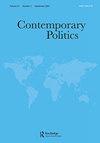Informal networks and influential politicians in China: SNA-study of full CC CCP members
IF 2
3区 社会学
Q1 POLITICAL SCIENCE
引用次数: 2
Abstract
ABSTRACT The article offers a methodology to overcome the shortcomings in the factionalism approach to studying elite politics in China. The authors study professional ties among 204 full members of the Central Committee of the Chinese Communist Party through social network analysis to identify influential members of the elites and detect their communities. Four types of data calculation are used – degree, betweenness, closeness and eigenvector centralities, as well as Louvain method to identify clusters of interconnected members of the network. Xi Jinping has no match per betweenness centrality; once a major contender for becoming China’s leader Vice Premier Hu Chunhua scores the second. Shanghai is a key contributor of elites in spite of Xi promoting loyal cadres from Zhejiang and Fujian. The concentration of power in Xi’s hands is confirmed, the imbalance between centrality scores and real positions of certain officials speaking for a reduced sustainability of the political system.非正式网络与中国有影响力的政治家:中国共产党正式党员的国民账户体系研究
本文提供了一种方法,以克服派系主义方法研究中国精英政治的不足。作者通过社会网络分析,对204名中国共产党中央委员会正式成员的职业关系进行了研究,以确定有影响力的精英成员并发现他们的社区。使用了四种类型的数据计算——度、间度、接近度和特征向量中心性,以及Louvain方法来识别网络中相互连接的成员的聚类。曾是中国领导人主要竞争者的副总理胡春华排名第二。
本文章由计算机程序翻译,如有差异,请以英文原文为准。
求助全文
约1分钟内获得全文
求助全文

 求助内容:
求助内容: 应助结果提醒方式:
应助结果提醒方式:


